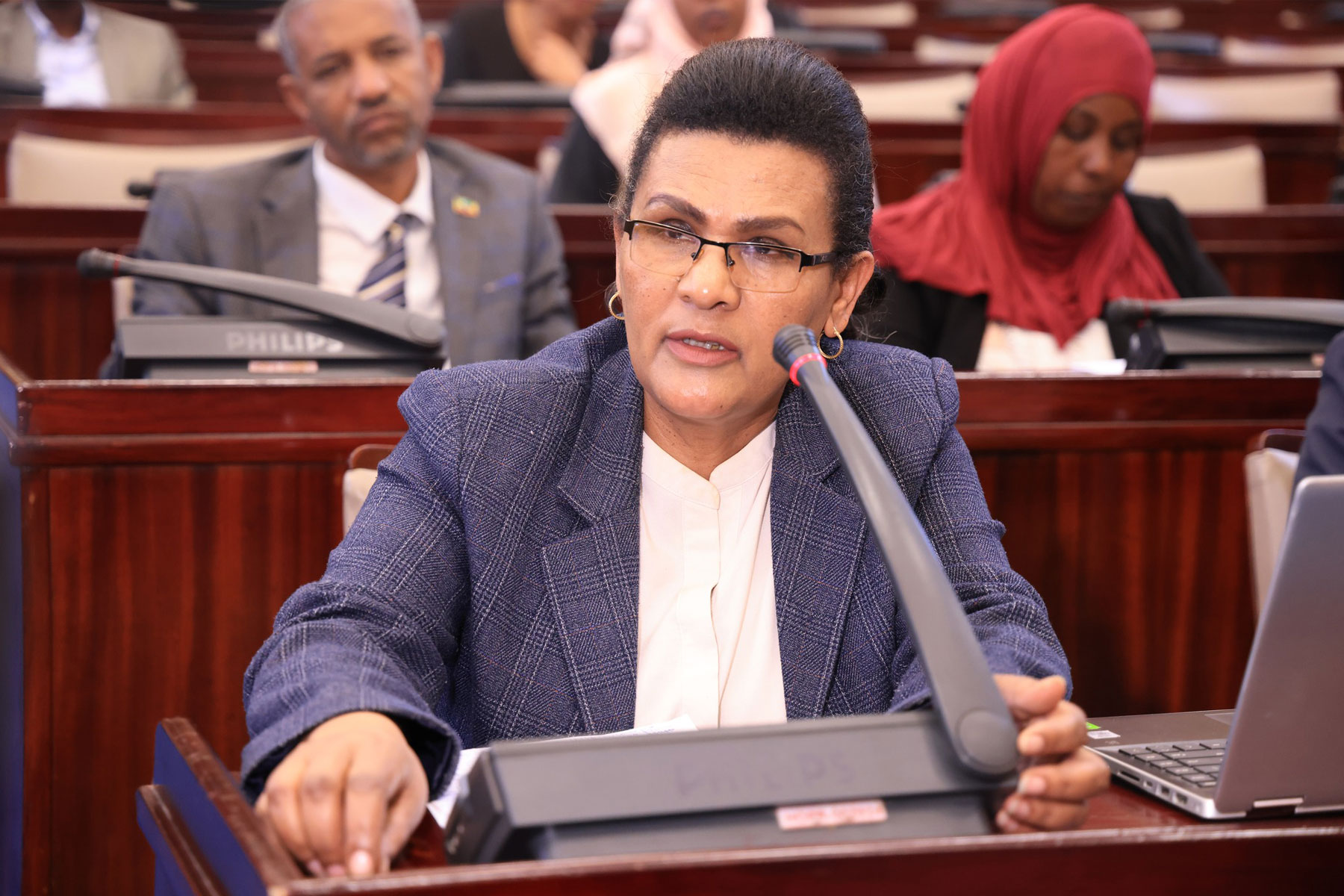
Fortune News | Apr 28,2024
The excise tax levied on pure alcohol has substantially decreased by six folds in a recently proposed excise tax amendment proclamation. It entails that the 60pc tax is reduced to 10pc.
The excise tax levied three years ago on pure alcohol, which is used as a crucial ingredient in several spirits, had resulted in manufacturers paying up to 140pc in taxes combined with the 80pc imposed on the finished product.
Labelled by some as a 'sin tax' during the period, it had led to the indignation of several spirit manufacturers, with some being forced to shut down.
At a discussion called by Desalegn Wedajo, chairperson of the Plan, Budget & Finance Affairs Standing Committee within the Parliament last week, stakeholders from several industries pleaded their case against and for the proposed amendment.
The tax proclamation imposed three years ago required slight adjustments, according to State Minister for Finance Eyob Tekalign (PhD), who also suggested constant tweaking of policy is necessary for any functional economy.
Espoused at the time as prioritizing public health, the excise tax proclamation three years ago levied taxes on several items deemed as luxury or negatively impacting public health, such as alcohol, tobacco, cooking oil, sweets and bottled water, receiving an award from the WHO for its contribution to tobacco control.
Abdulsemed Hussien (MD), who appeared to represent the chairperson of the Standing Committee on Health, Social Development, Culture & Sports, was unimpressed over the proposed tax proclamation.
His fury seems to have arisen from the decrease of the excise tax on pure alcohol and sweets, a 20pc tax levied on smoking pipes, and 30pc on electronic cigarettes of all types, which are prohibited from entry under a different set of laws.
"It's a blow to the country's health system," he told Parliament.
The "confusion" was later clarified by the State Minister, Abdulsemed told Fortune that stronger measures against cigarettes should be maintained.
The complete exemption is extended to video cameras while water bottling and cigarette companies remain as they are in the proposed proclamation.
The 197pc total taxes levied on cigarettes, bore by the sole licensed manufacturer of cigarettes in the country Japan Tobacco International(JTI), was instrumental in championing public health by Parliamentarians.
Yayehyirad Abate, who represented employees from JTI, indicated that despite a 40pc decline in their output since the imposition of the excise tax three years ago, the number of smokers through illicit trade had seen a 55pc increase. He also remarked that they have had to let go of 318 employees due to the decline in output.
"We are not debating the harmful effects of cigarettes but rather the efficiency of the taxation in decreasing them," he told the Standing Committee.
Wasihun Abate, the tax policy advisor at the Ministry of Finance, agrees that taxes might have contributed to the growth, especially with cigarettes. However, the absence of an observable decline in the number of smokers does not hold water for him.
"Taxes can't disincentivise behaviour by themselves," he said.
Despite no change being made to their excise tax duties, the bottled water lobby led by Getnet Belay was the most vocal among stakeholders in attendance. The three-year-old Association includes bottled water, soft drinks, fruits and vegetable processing and manufacturing industries.
Getnet said inconsistency between federal and regional tax bureaus, along with the categorization of bottled water as a luxury item, was a source of industry woes.
"We shouldn't be looked through the same lens as alcohol and cigarettes," he told the Standing Committee.
A local tax expert at Addis Abeba University commented on the issue.
The increment in contraband cigarettes was not the least bit surprising to the expert, who indicated that centralization of products and facilities increases the likelihood of taxation.
The expert indicated that emphasis on applicability is essential in the creation of regulation, and substitution effects should always be considered.
The 10pc excise tax duty demanded from water bottling companies results from a decrease from a nominal 30pc initially levied on the companies three years ago. Getnet suggested that a quarter of the 107 water bottling companies had gone out of business because of the high cost of production compounded by the excise tax.
"Your industry is in crisis not because of taxes but rather inflation," said Wasihun in response to concerns by the water lobby.
Wasihun, a veteran with over three decades of experience in the sector, underscored that the rise in the cost of plastic bottling, which sources petroleum byproducts heavily, is the reason behind the lacklustre performance of the industry rather than taxes.
With the majority of the country's population not having access to tap water, ascribing an elevated regard towards the importance of bottled water was not received well by the tax policy advisor.
While contentions on the relative importance of some of the products within the excise tax proposition could serve as fodder for speculation, few can dismiss the absolute vitality of edible oil to households.
Citing difficulties in the implementation of the removal of edible oil containing more than 40g/100 of saturated fat from the list of items liable for excise taxation riled up members of the medical community.
The government of Ethiopia collected 336.7 billion Br in the budget year that ended in July, with nearly 60pc being collected from domestic taxes. This was 94pc of the target, which falls along the current trajectory to raise tax-to-GDP ratios to 18pc within the decade.
Wendu Bekele, executive director of Mathiwos Wondu Ethiopian Cancer Society, cautioned against the dangers of saturated fatty acids, dismayed by their apparent removal from the list of taxed items.
This sentiment was also shared by Samson Tefera, a member of the Tesfa Association, comprising patients of chronic kidney disease who spoke at the session.
The exact reason given for the removal of the edible oil by both Wasihun and Eyob from the Ministry was that the customs commission, Ministry of Revenues and edible oil manufacturers lacked the equipment to conduct tests that determine the composition of the oils.
While the State Minister suggested that it is a matter of time before the technical capacity is obtained by the Ministry of Health, Wasihun chose to emphasize the importance of having a tax policy that is actually applicable and collectable.
It seems that some importers and manufacturers labelled their edible oil products regardless of the content just to be exempt from 4omg/100 standards set forth by the proclamation three years ago.
The absence of literal technical capacity to determine the composition of the oils had led to several contentions between different government bureaus leading to its removal from the taxed item groups.
Desalegn Wedajo, the chairperson of the Standing Committee, surmised the session indicating its productivity while reminding attendees that the excise tax proclamation has been in Ethiopia since 1924 and is nothing new.
The Chairperson indicated that the two-month-old set of proposed reforms would be looked at further by the committee, especially with regard to the edible oil and inconsistencies with execution between federal and regional applications before its signed into law.
PUBLISHED ON
Apr 03,2023 [ VOL
24 , NO
1196]

Fortune News | Apr 28,2024

Fortune News | Dec 26,2020

Fortune News | Sep 07,2025

Radar | Dec 01,2024

Verbatim | Jul 17,2022

Sunday with Eden | Jun 07,2025

Radar | Feb 08,2020

View From Arada | Nov 11,2023

Agenda | Jul 06,2025


Dec 22 , 2024 . By TIZITA SHEWAFERAW
Charged with transforming colossal state-owned enterprises into modern and competitiv...

Aug 18 , 2024 . By AKSAH ITALO
Although predictable Yonas Zerihun's job in the ride-hailing service is not immune to...

Jul 28 , 2024 . By TIZITA SHEWAFERAW
Unhabitual, perhaps too many, Samuel Gebreyohannes, 38, used to occasionally enjoy a couple of beers at breakfast. However, he recently swit...

Jul 13 , 2024 . By AKSAH ITALO
Investors who rely on tractors, trucks, and field vehicles for commuting, transporting commodities, and f...

Oct 25 , 2025
The regulatory machinery is on overdrive. In only two years, no fewer than 35 new pro...

Oct 18 , 2025
The political establishment, notably the ruling party and its top brass, has become p...

Oct 11 , 2025
Ladislas Farago, a roving Associated Press (AP) correspondent, arrived in Ethiopia in...

Oct 4 , 2025
Eyob Tekalegn (PhD) had been in the Governor's chair for only weeks when, on Septembe...